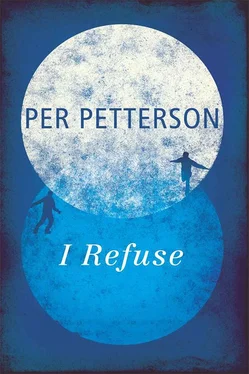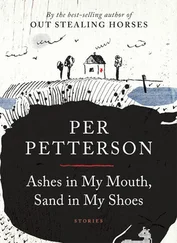‘How are you doing,’ the steward said. He laid a hand on her shoulder and squeezed it gently, it was a fatherly hand, a fatherly grip, do you feel better now, he said, can you feel your hands, can you breathe properly, and she sent him a barely visible smile and shrugged.
It was easy for all to see how attractive she was, the shape of her body, how defined it was, it had been easy to see the whole way from Oslo, whatever clothes she was wearing, aprons, skirts, jumpers, trousers, but it was not intentional on her part, she wore what she wore because it seemed practical to her. For a while they had all been concerned, no doubt about it, especially the young ones fell apart when she got ill, but it was already forgotten, and the steward did what he had decided to do out in the North Sea several weeks before. He walked with her along the catwalk just out from Mombasa, where they were not docking on this voyage, and he asked her to stop, and they stood, hovering high above the deck, and he said:
‘You gave us a shock, you should know that, there was no one on board that wasn’t affected, but now you’re well again, and beautiful, yes, you are, every one of us can see that. They’re good boys, most of them, make no mistake, so you’ll be fine for the rest of the trip, it’s not that, but to be be frank with you, it would be best if you chose one and stuck to him. Then none of us would have a problem.’
She looked at him, was he serious.
He was.
‘Then I choose you.’
‘I’m married,’ he said.
She shrugged. It was all the same to her.
She’d made a remarkably quick recovery, and she looked really good now, and it wasn’t something she was trying to hide, she played with her cards on the table, or so he thought, but there was this thing about her he couldn’t grasp, which made him a little nervous. Though it wasn’t easy to say no to her for her linen trousers clung to her hips and her thighs in the wind, and there was something about those lines around her mouth and how her hair was pinned up and the skin beneath it so naked to the sun, and here she stood on the catwalk and it came to him that she probably had no idea how striking she looked. And his first thought, was the one many men would have had, that it was his task to reveal this to her.
‘Fine,’ he said. ‘That’s it then.’
He already had some regrets on the first evening, in the darkness, with the tropical night outside, not a light to be seen and Fru Berggren beneath him. His cabin was twice as big as hers or even bigger, and there were men’s things scattered around the room. There were cuttings on the wall of places he had been and football matches in black and white, framed with the ocean on both sides of the ship and football teams on deck with him kneeling in the front row holding the ball in his gloved hands, and there were bashful half-nude models on the bathroom door, a drawing pin in each corner. A Gillette shaver lay in a bowl on the dresser, above the bunk hung a guitar from a nail in the wall, and the strings were frayed and worn and brown and lifeless from too little use over too many years, and a table tennis bat lay on the floor under the desk. Everyone on board had at least one. He had a shelf of books from the farthest-flung places in the world, from Borneo, from Arabia, and Persia from the roof of the world, on board a Fulvio yacht in the spray of a storm around Cape Horn, on horseback across the North American prairie. There were many novels too. Which was not so masculine, maybe.
He lifted himself off her breast with his elbows straight, and the darkness in the cabin was so all-consuming he could hardly see her beneath him, and in the heat of the African night her skin was cool and white, it felt white to him, and he said:
‘You have to make an effort. You really have to. Or else it’s no good. Do you understand what I’m saying. You have to concentrate.’
‘Oh yes,’ she said at once. ‘I know what you mean. I will. Cross my heart.’
The morning after, he had a strange feeling. He felt alone. He used to read in bed, but he didn’t feel like reading. He got up and sat down naked on the chair by the desk, light came pouring from the porthole. She was still under his duvet. He lit a cigarette, he thought, I can just tell her when it’s over. It’s over, I can say, do you understand that, when I know I can’t do it any more. And then he thought, but who else would want her then, on board this ship, and he suddenly realised it was already too late to turn her away.
And then, some months later, she changed to another shipping line. The steward couldn’t remember what she gave as a reason, but when she went ashore in Singapore to catch another boat before it departed and left the busy city-state, he felt a relief so great that it made him ashamed. The new company wasn’t Norwegian and didn’t dock in Oslo or Bergen or any other Norwegian town. Nor did it dock anywhere else in Europe, but sailed between countries in South East Asia and the east coast of Africa, and leaning over the railing, watching her cool, slim back in her yellow blouse grow smaller on her way down the gangway, he had a strange feeling he was the last person to see her alive.
SO I RANG off. He wasn’t dead. Right.
I had seen my father only once in forty years. He was standing by the entrance to Lillestrøm station, the old one, smoking under the clock there, leaning against the wall. He had a beard he didn’t have before. He held his jacket together at the neck, it was a grey jacket, a kind of blazer, or an old, threadbare suit jacket, the way Salvation Army jackets had always looked, but it should have been a coat, a down jacket, something warm, something with a lining, it was so goddamn cold that day, it was December and way below zero, but I didn’t walk up to my father to give him my coat. No peace. Not the other cheek.
And now that too was many years ago, and he looked old even then, and I was convinced I wouldn’t know him if I went up to the police station in Upper Romerike. And yet it was my name, Tommy Berggren’s name, he had given when they must have asked after close relatives they could contact. Was he so sure that he would know me , or didn’t he have anyone else they could ring. It seemed unlikely after all the years that had passed. And what would happen if I didn’t turn up, if I just let it pass. It would have been so easy. I didn’t know what would happen. Was it an important decision I had to take, and if I didn’t go, would it trouble me for the rest of my life. I didn’t know that, either.
I got up from the desk, went into the corridor, opened the door to the office next to mine, poked my head in and said:
‘I’m going now,’ and they looked at their watches, I had only just come, they thought, a few minutes ago. ‘I’m taking the day off,’ I said, and then they said, go, just go, you’ve earned it, they said, the market won’t collapse just because Tommy Berggren takes this day off, away with you, they said, take the day off. But I could take any day off. I worked too hard, for long hours. I was well paid but my blood pressure was going haywire. I had to take pills.
And then back down to the garage in the lift, and when I put my hand on the bonnet the metal was still warm. I got in and turned the key, and the car started first time, it would have been a scandal if it didn’t, given the money I had paid for it. It was a quarter-past eight, and the police had rung me early, it was a shot in the dark on their part and they hit the mark. I drove through the centre of Oslo, alongside the railway line at first and a cream-coloured mist was drifting over the rails towards the Ekerberg Ridge, the same way I was going, like a river it rolled between the platforms and looked like something you saw only in dreams. And I drove into the tunnels beneath Vålerenga, Etterstad and further north-east, past Karihaugen, Lørenskog and the hotel called Olavsgaard, where the bar on the ground floor was known as the Last Chance Shed, and if you went home alone from that bar in the early hours, there was something wrong with your person you needed to do something about. I had been there a few times myself, several years ago, and when I left I was never alone.
Читать дальше












